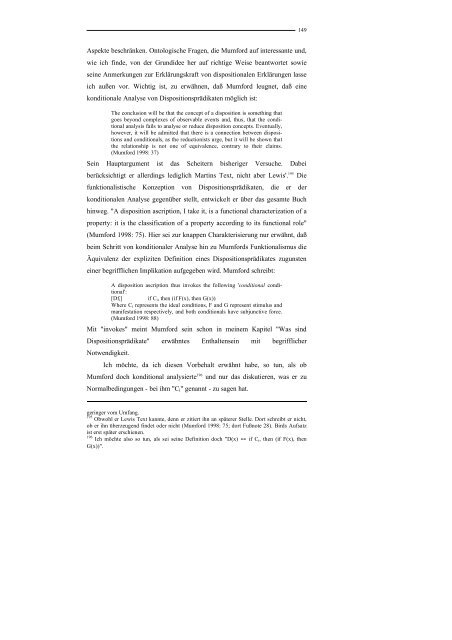Conditional Analyses.pdf - causation | laws | dispositions | explanation
Conditional Analyses.pdf - causation | laws | dispositions | explanation
Conditional Analyses.pdf - causation | laws | dispositions | explanation
Sie wollen auch ein ePaper? Erhöhen Sie die Reichweite Ihrer Titel.
YUMPU macht aus Druck-PDFs automatisch weboptimierte ePaper, die Google liebt.
149<br />
Aspekte beschränken. Ontologische Fragen, die Mumford auf interessante und,<br />
wie ich finde, von der Grundidee her auf richtige Weise beantwortet sowie<br />
seine Anmerkungen zur Erklärungskraft von dispositionalen Erklärungen lasse<br />
ich außen vor. Wichtig ist, zu erwähnen, daß Mumford leugnet, daß eine<br />
konditionale Analyse von Dispositionsprädikaten möglich ist:<br />
The conclusion will be that the concept of a disposition is something that<br />
goes beyond complexes of observable events and, thus, that the conditional<br />
analysis fails to analyse or reduce disposition concepts. Eventually,<br />
however, it will be admitted that there is a connection between <strong>dispositions</strong><br />
and conditionals, as the reductionists urge, but it will be shown that<br />
the relationship is not one of equivalence, contrary to their claims.<br />
(Mumford 1998: 37)<br />
Sein Hauptargument ist das Scheitern bisheriger Versuche. Dabei<br />
berücksichtigt er allerdings lediglich Martins Text, nicht aber Lewis'. 195 Die<br />
funktionalistische Konzeption von Dispositionsprädikaten, die er der<br />
konditionalen Analyse gegenüber stellt, entwickelt er über das gesamte Buch<br />
hinweg. "A disposition ascription, I take it, is a functional characterization of a<br />
property: it is the classification of a property according to its functional role"<br />
(Mumford 1998: 75). Hier sei zur knappen Charakterisierung nur erwähnt, daß<br />
beim Schritt von konditionaler Analyse hin zu Mumfords Funktionalismus die<br />
Äquivalenz der expliziten Definition eines Dispositionsprädikates zugunsten<br />
einer begrifflichen Implikation aufgegeben wird. Mumford schreibt:<br />
A disposition ascription thus invokes the following 'conditional conditional':<br />
[Df i ] if C i , then (if F(x), then G(x))<br />
Where C i represents the ideal conditions, F and G represent stimulus and<br />
manifestation respectively, and both conditionals have subjunctive force.<br />
(Mumford 1998: 88)<br />
Mit "invokes" meint Mumford sein schon in meinem Kapitel "Was sind<br />
Dispositionsprädikate" erwähntes Enthaltensein mit begrifflicher<br />
Notwendigkeit.<br />
Ich möchte, da ich diesen Vorbehalt erwähnt habe, so tun, als ob<br />
Mumford doch konditional analysierte 196 und nur das diskutieren, was er zu<br />
Normalbedingungen - bei ihm "C i" genannt - zu sagen hat.<br />
geringer vom Umfang.<br />
195 Obwohl er Lewis Text kannte, denn er zitiert ihn an späterer Stelle. Dort schreibt er nicht,<br />
ob er ihn überzeugend findet oder nicht (Mumford 1998: 75; dort Fußnote 28). Birds Aufsatz<br />
ist erst später erschienen.<br />
196 Ich möchte also so tun, als sei seine Definition doch "D(x) ↔ if C i , then (if F(x), then<br />
G(x))".


